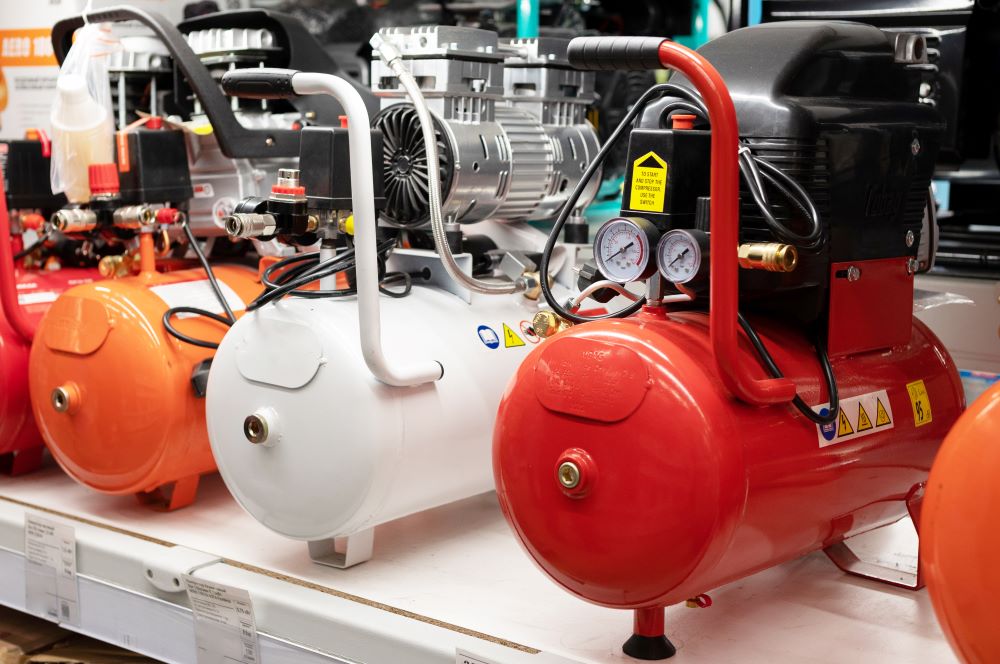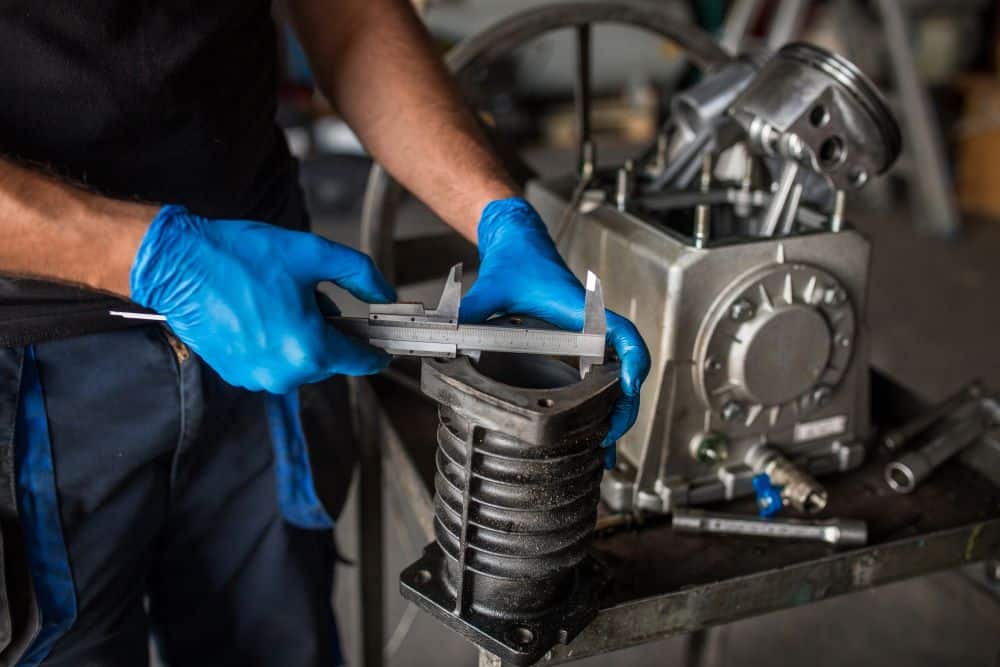How to Maintain an Oil Free Air Compressor

Even the smallest amount of oil can leave your operations vulnerable to contamination, leading to production delays or spoilage of your end product.
That’s why, for industries that require the best and cleanest air possible, an oil free air compressor could be their best bet in ensuring safety, quality, and compliance. We’re talking about food and beverage processing, pharmaceutical, and textile manufacturing industries, among others.
Besides purified air and a lowered risk of contamination, oil free air compressors don’t require regular oil changes, which means significantly less maintenance than oil-lubricated ones. However, this doesn’t imply that an oil free air compressor maintenance is not necessary at all.
Preventive maintenance like wear and tear prevention and peak performance optimisation must be performed to prolong an air compressor’s lifespan and efficiency.
From maintenance to troubleshooting tips, we’ll share essential tips to keep your oil free compressor running smoothly.
Understanding the Basics of an Oil-Free Air Compressor
Air compressors translate power into potential energy stored in pressurised air via an electric motor, gasoline engine, etc. It uses different methods to push more air into a storage tank, increasing the pressure inside.
When the pressure reaches its maximum limit, the compressor turns off. The compressed air stays in the tank until it’s needed. The energy in the compressed air can then be used for different applications like generating movements, lifting, cleaning, or cooling materials.
An air compressor can be oil-free, so it operates without needing oil lubrication. Alternative materials like Teflon coating may be used to reduce friction and keep the mechanism operating smoothly even without lubrication. With this type of air compressor, you can enjoy cleaner air and even reduce environmental pollution.
Although it requires less maintenance, its components, such as air filters, valves, tanks, and more, will likely need regular attention to support optimal operation.
Oil Free Air Compressor Maintenance Strategies for Lasting Use
Daily Maintenance Tips
- Inspect for Leaks: A big part of your oil free air compressor maintenance methods is to check for leaks around the area of the compressor, both when it’s turned off or on. Indicators of a leak include decreased air pressure and a rise in power consumption as the system works harder to make up for the lost air. You can also try to search for holes to check if there is anything that needs to be replaced or repaired.
- Check Air Filters: A clogged air filter can affect airflow quality–filters are, after all, what prevent contamination from passing through the process. Checking and cleaning air filters regularly are essential to maintain the compressor’s good performance. Clean filters also help avoid overheating.
- Monitor Operating Temperature by Cleaning the Cooling System: Your air compressor shouldn’t have to work harder to maintain the proper production levels. Keeping the cooling system clean is essential to prevent overheating.
- Check Pressure Gauges: Monitor the oil-free compressor while it’s running and check for optimal pressure levels during use. Ensure it’s not too high, which may damage the compressor and negatively affect its lifespan.
Weekly Maintenance Tasks
- Inspect for Condensation: Drain the moisture from the tank regularly (most recommend weekly intervals) to prevent the tank from rotting and contaminating compressed air. Failure to do so can cause the oil free compressor to be damaged, or worse, stop working. Remember that before opening a drain valve, the compressor must be turned off and depressurized.
- Check Safety Features: Ensure that all safety features, such as air compressor safety valves, function accordingly to maintain safe operations and high-quality products.
- Clean Exterior: Remove dust and debris that may gather on the exterior surfaces. You would also want to inspect hoses, valves, seals, and other oil free air compressor components and look for cracks or any signs of wear and tear.
Monthly and Long-Term Maintenance
- Replace Air Filters: Depending on usage, filters may need replacement rather than just cleaning. Replace air filters regularly, particularly when dirt piles up, and prevent debris from getting trapped inside the air compressor. This way, you’ll ensure high-quality air output and efficient air compressor performance.
- Inspect and Tighten Bolts: Air compressors produce vibrations, causing bolts and screws to loosen up. Ensure that all parts are securely fastened by inspecting the compressor monthly and tightening any components needed.
- Check for Unusual Noises: Address any irregular sounds that could indicate mechanical issues. Possible causes of excessive noise include loose components or unbalanced or worn parts.
- Electrical Checks: Monitor and ensure connections and wires are in good condition. Look out for fuses, breakers, and pressure switches.
Best Practices for Storage
Oil free air compressor maintenance does not only entail performing checks or assessments. Preventive care also involves preserving the air compressor’s condition and functionality by implementing effective storage strategies.
Proper Shutdown Procedure
After operating the compressor, turn off the motor and disconnect it from the power source if it’s operated by electricity. Close the regulator valve and release any trapped air. Keep the drain valve open until the next use to prevent damage from condensation.
Ideal Storage Conditions
Avoid damp environments that may cause rust or electrical issues. Your storage space must be clean and ventilated properly, with a temperature of around 59° F.
Cover and Protection
Clean your space regularly to ensure dirt will not enter your air compressor’s openings or filters. For long periods of disuse, you can use covers to prevent dust buildup.
Troubleshooting Common Issues

Pressure Loss
One sign of an air compressor pressure loss is a drop in the quality of the air-powered tools. The issue is typically due to design factors or air compressor blockages. In addressing this, optimise design by choosing air compressor parts that minimises pressure drop. Conduct thorough compressor checks and replace faulty parts.
Decreased Performance and Compressor Failure
If your oil free air compressor fails to start, check first the power button and switch. They may be disconnected. If lacking electrical power is not the culprit, it may also have insufficient air pressure related to the cut-in pressure.
On the other hand, if the compressor is running but isn’t generating any air pressure, there might be a problem with your air intake pump. The issue could also lie with the gasket separating the low-pressure and high-pressure sections of the compressor. Replacing these components can improve your machine’s performance.
Unusual Noises
Unusual sounds in your oil-free air compressor may involve mechanical or operational issues. In troubleshooting this concern, you must conduct a visual inspection and check for visible and obvious damage. Take note of the type of noise it is making.
Rattling sounds may indicate loose parts, banging noise may point to air tank or motor mount issues, or hissing may often mean air leaks. If available, you can also use diagnostic tools. Adjust or repair as necessary.
Maintenance is necessary to extend the life of an air compressor–even if it’s oil-free
The longevity of an oil-free air compressor heavily lies in proper and regular care. Oil free air compressor maintenance is a daily to long-term commitment that advocates for your product and operation’s safety and reliability.
From performance assessments to storage best practices, oil free air compressor maintenance requires preventive efforts to minimise downtime risks and increase efficiency.
Lian Beng Machinery Co. is an industrial & construction machinery wholesaler dedicated to providing high-quality equipment and support to our clients. Our technicians deliver exceptional service and quality backed by extensive experience in the field.
All of our air compressor products are exported worldwide and conform to ASME standards code, fabrication, and certification. Pair it up with careful and proper maintenance habits, and you’ve assured not only compliance with safety regulations but also optimal performance and longevity for your equipment. Contact us to learn more.
